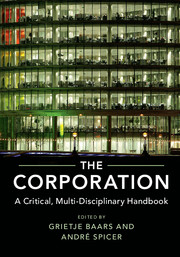Book contents
- Frontmatter
- Contents
- List of Contributors
- Acknowledgements
- Introduction: Why the Corporation?
- PART I DISCIPLINARY OVERVIEWS
- PART II INTERDISCIPLINARY THEMATIC CHAPTERS
- 1 The Evolution of the Corporate Form
- 2 The Multinational Corporate Group
- 3 The Financialization of the Corporation
- 4 Corporate Value Chains
- 5 Corporate Citizenship
- 6 The Corporation and Crime
- 7 The Corporation and Ideology
- a Bad Parresia: CSR and Corporate Mystification Today
- b Capital, Corporate Citizenship and Legitimacy: The Ideological Force of ‘Corporate Crime’ in International Law
- c Corporate Foundations and Ideology
- 8 Corporation and Communities
- 9 Corporations and Resistance
- 10 Alternatives to the Corporation
- Index
- References
a - Bad Parresia: CSR and Corporate Mystification Today
from 7 - The Corporation and Ideology
Published online by Cambridge University Press: 31 March 2017
- Frontmatter
- Contents
- List of Contributors
- Acknowledgements
- Introduction: Why the Corporation?
- PART I DISCIPLINARY OVERVIEWS
- PART II INTERDISCIPLINARY THEMATIC CHAPTERS
- 1 The Evolution of the Corporate Form
- 2 The Multinational Corporate Group
- 3 The Financialization of the Corporation
- 4 Corporate Value Chains
- 5 Corporate Citizenship
- 6 The Corporation and Crime
- 7 The Corporation and Ideology
- a Bad Parresia: CSR and Corporate Mystification Today
- b Capital, Corporate Citizenship and Legitimacy: The Ideological Force of ‘Corporate Crime’ in International Law
- c Corporate Foundations and Ideology
- 8 Corporation and Communities
- 9 Corporations and Resistance
- 10 Alternatives to the Corporation
- Index
- References
Summary
Introduction
Some very interesting and significant changes are occurring in the way corporate ideology functions in neoliberal societies today. Rather than distorting the truth by grossly misrepresenting the actual activities of the business – a manoeuvre perhaps best epitomized by corporate social responsibility (CSR) and other ‘greenwashing’ programmes – partial admissions of truth are now a prominent feature of corporate discourse. But rather than this representing a progressive development in corporate ethics, this chapter will maintain that something more sinister is transpiring. Such truth-telling is actually a tactic of mystification that critics of the corporate form must explain in order to remain one step ahead of capitalist ideology. As I will demonstrate, instead of large organizations – including arms manufacturers, oil prospectors and tobacco firms – issuing completely false and thus incredulous statements about themselves, we can note a contextualized truth-telling (‘yes, we do some bad things’). Strangely, however, such truths are designed to hide the real situation even more convincingly than over-the-top falsehoods.
Let me briefly present an example of this neoliberal approach to corporate ideology, let's take one large firm active in the dirty industries, British Petroleum, and the fascinating public relations exercise it launched in 2000. With the growing fanfare around green / alternative energies in the late 1990s, a swelling critical concern about the petroleum industry's poor environment / human rights record, a flagrant disregard for workers’ rights and claims of exorbitant profiteering, the firm decided to rebrand itself ‘Beyond Petroleum’. A new trade mark was unveiled called the Helios – an ancient Greek sun god, symbolizing the firm's openness to energy sources of many kinds. The company stated: ‘the group said it had decided to retain the BP name because of its recognition around the world and because it stood for the new company's aspirations: “better people, better products, big picture, beyond petroleum”’. The hypocrisy and cynicism of this policy was widely derided, of course. So recently BP was obliged to clarify what ‘Beyond Petroleum’ actually meant. In doing so, it added an accurate truth to its definition stating that ‘it is shorthand for what we do … producing more fossil fuels’.
At least that was honest, some may say! However, this confessional and tactical truth-telling was still set against the broader symbolic backdrop of green plants, happy workers and a blue sustainable planet.
- Type
- Chapter
- Information
- The CorporationA Critical, Multi-Disciplinary Handbook, pp. 411 - 418Publisher: Cambridge University PressPrint publication year: 2017
References
- 1
- Cited by



